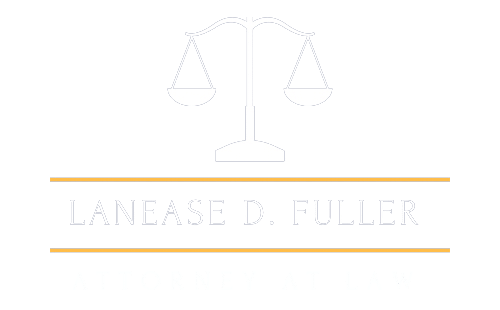Estate planning is a crucial process that ensures your assets are distributed according to your wishes after you pass away. As Attorney Lanease D. Fuller, it’s essential to navigate this intricate journey with diligence. In this comprehensive guide, we outline the steps involved in creating a will and planning your estate.
Identify Your Assets
To initiate the estate planning process, start by listing your significant assets. Determine which items will be distributed through other methods outside the will, such as naming beneficiaries for retirement accounts or bank accounts. In the case of joint ownership with a spouse, each spouse should create a separate will, leaving their share of jointly owned assets.
Choose Beneficiaries
Deciding who will inherit your property is a pivotal step. While it may seem straightforward for most, caution is advised when excluding spouses or children from the will. After making primary choices, designate alternate (contingent) beneficiaries in case the primary choices do not survive you.
Select an Executor
Your will allows you to appoint an executor responsible for executing its terms. This individual oversees the probate process, asset distribution, and payment of debts and taxes. While specific training is not mandatory, ensure the chosen person is willing to serve and won’t be surprised by the responsibility.
Designate a Guardian for Children
If you have minor children, determine who will raise them in the unlikely event that both parents are unavailable.
Choose a Property Manager for Children
If your will includes property for children or young adults, select an adult to manage their inheritance. Options include a property guardian, a property custodian under the Uniform Transfers to Minors Act (UTMA), or a trustee.
Create Your Will
There are various ways to create a will:
- Hire a lawyer for personalized legal advice if needed and affordable.
- Use a statutory form (available in select states).
- Make a will yourself using high-quality do-it-yourself software or services, especially for simple estates and straightforward wishes.
Witness and Sign Your Will
After creating your will, sign it in the presence of at least two witnesses. If using a “self-proving affidavit,” notarize your signature for simplicity during probate.
Securely Store Your Will
Store your will in a safe, clearly labeled place, sharing its location with your appointed executor. Keeping it with other important documents in a readily accessible location is advisable. A lockbox is not necessary and could potentially delay the probate process.
As Attorney Lanease D. Fuller, embracing a meticulous approach to estate planning ensures that your clients’ wishes are honored, their assets are protected, and their loved ones are provided for in the future.
Types of Property You Can’t Include When Making a Will
When it comes to property, it’s easy to make the assumption that you should include anything and everything in your Will. After all, you’ve spent your whole life building a legacy and you likely want to make sure everything is accounted for and properly passed on to your loved ones.
However, there are certain cases in which leaving out property will actually benefit your loved ones even more. This isn’t to say that certain property should be left out of your estate plan entirely. You can make special arrangements to pass on property without including them in your Will. Here are specific examples the help explain this concept:
- Property held within a Trust
- Property with beneficiary designations
- Jointly-owned property
- Property you want to leave to a pet
- Gifts with conditions and special instructions
Property held within a Trust
A Trust is a separate fiduciary agreement that is not subject to probate and can be used to distribute your assets. As we discussed before, a Will does not escape the probate process. However, a Trust does. Because of this, many individuals prefer to place almost all of their property into a Trust. To avoid creating any conflicts of interest, avoid listing any property already held in a Trust in your Will.
Property with beneficiary designations
There are several types of assets and accounts that are payable to a beneficiary upon death. This is called a beneficiary designation, and is often associated with bank accounts (a totten trust), investment accounts, and life insurance policies. This is another instance when there’s nothing stopping you from listing out these types of accounts in your Will, but it may be best not to. This is because the financial entity requires that you name a beneficiary on the account itself. When you pass away, that account will be paid out to the designated beneficiary associated with the account, regardless of what your estate plan says. If you accidentally bequeath the property to a different beneficiary in your Will, you could inadvertently create a lot of conflict. Instead, it’s best to include your beneficiary designation in your informal letter of instruction so that your family members are made aware of the accounts.
Jointly-owned property
Any property that you own jointly with another family member, such as a home with your spouse, or an investment with a sibling, can be left out of your Will. When you pass away, the property will pass directly to your co-owner. If you’re planning your estate, it will be helpful to find out whether or not you live in a community property state. In these states, property that you owned during marriage is split equally with your spouse. In the case of death, everything automatically goes to your surviving spouse. If this applies to you, you can leave out any community property out of your Will.
Property you want to leave to a pet
If you want to leave your pet some money and other belongings, you can certainly do so. However, pets do not have any legal claim to property. Instead of leaving a gift to Fido in your Will, it’s best to name a guardian. Then, you can arrange for property to go to the guardian in the case of your death so that they can care for your pet.
Gifts with conditions and special instructions
You are probably getting the idea by now that a Will is not always the most appropriate document for bequeathing everything in your estate. It’s a great tool for simple, one-time transactions. If you have any property you want to leave with conditions and special instructions, you are better off adding a Trust to your estate plan. You can also relay your personal sentiments in a letter of instruction to help inform your family of your wishes. Note that these letters are informal and not legally-binding. They should be used in tandem with your Trust and Will.
Crafting a robust estate plan requires a significant level of expertise and experience. This encompasses a spectrum of tasks, including the creation of wills, revocable living trusts, powers of attorney, medical powers of attorney, and more. Without a pre-established estate plan, the state of Texas may dictate the allocation of your assets, potentially resulting in outcomes that deviate from your desires.
To circumvent this scenario, it is advisable to collaborate with a seasoned estate planning attorney in Houston. Such a professional can guide you in honoring your wishes posthumously. The meticulous drafting of an estate plan holds immense value, acting as a pivotal determinant in whether your intended belongings are bequeathed to your loved ones or subject to the state’s arbitrary division of your property. Taking the initiative to commence the estate planning process today ensures that your intentions prevail.
As a Houston wills and trust lawyer, Attorney Lanease Fuller emphasizes the urgency of action. If you have conceptualized a plan for the distribution of your property but have yet to formalize it, prompt action is essential. Recognizing the uncertainty of tomorrow, taking the necessary steps now becomes a top priority. Establishing a concrete plan ensures that your wishes are upheld posthumously, preempting the need for a court to intervene.
Attorney Lanease Fuller, with her wealth of experience in wills and trusts, offers invaluable assistance in navigating this critical aspect of estate planning. Collaborating with an adept attorney becomes pivotal, especially when considering unforeseen factors that may not have been previously contemplated. The comprehensive approach taken by our firm leaves no stone unturned, ensuring the thorough drafting of a will that aligns with your unique circumstances. Delaying this crucial step could have consequences; hence, we encourage you to schedule an appointment with our firm today, ensuring your estate planning is comprehensive and future-proof.
Top Houston Estate and Will Planning Attorney
Houston’s leading estate planning expert, Attorney Lanease D. Fuller, specializes in navigating the intricate landscape of comprehensive estate planning in Texas. Offering a wealth of legal knowledge and strategic insights, Attorney Fuller serves as a reliable guide, assisting clients in crafting personalized estate plans tailored to their unique goals and circumstances. Whether it involves wills, trusts, healthcare directives, or estate tax minimization, her expertise ensures the protection of your legacy and provides assurance for your loved ones.
Initiate your estate planning journey promptly by connecting with Attorney Lanease D. Fuller in Houston. Taking this crucial step not only secures your family’s future but also brings peace of mind, all while sidestepping the complexities associated with probate. With Attorney Fuller’s guidance, you can embark on the path to safeguarding your assets and ensuring a seamless transfer of wealth, creating a lasting impact for generations to come.
LANEASE D. FULLER LAW
4615 S. Frwy St. 820
Houston, TX 77051
713-439-7400
Google Listing


